Master of Science in Civil Engineering: Training Tomorrow's Industry Leaders
5 Mar 2025
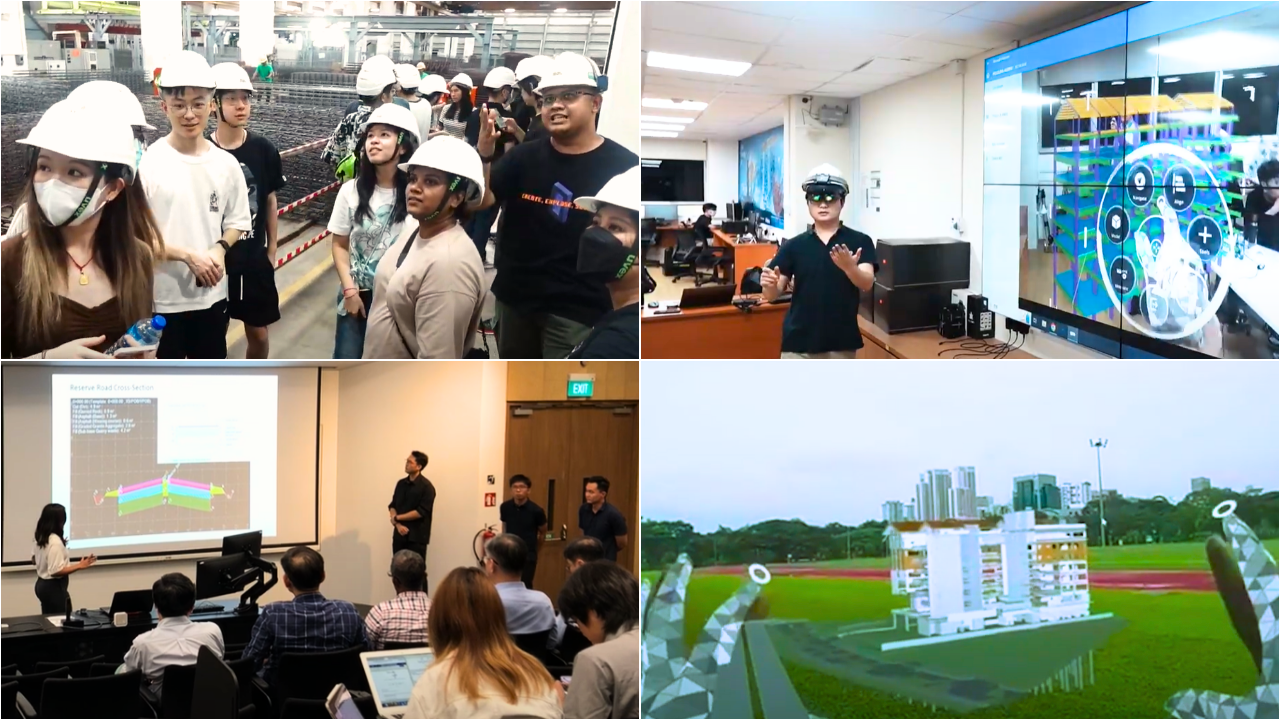
The Building and Construction Authority (BCA) expects a steady improvement in construction demand over the next few years, reaching between S$31 billion and S$38 billion from 2025 to 2028.
Under the BuildSG initiative, the built environment sector is undergoing a period of transformation, focusing on digitalisation, green building practices and smart technologies. The Master of Science in Civil Engineering programme is specially curated to equip graduates with the skillsets to lead and impact this ever-growing and evolving industry.
"We are not only looking to solve problems today. We are looking to solve tomorrow's issues," says Associate Professor Poh Leong Hien, Deputy Head (Graduate and CET Programmes). "For instance, we are seeking solutions to defend our coastal shorelines against rising sea levels, working towards higher construction productivity, and developing more sustainable engineering practices."
“We equip our students not just with technical knowledge, but with the adaptability and innovation mindset needed to address complex engineering challenges in a rapidly changing world.”
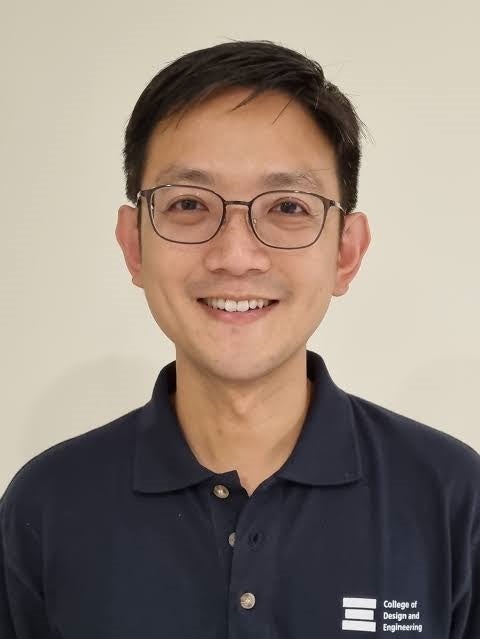
Associate Professor Poh Leong Hien
Deputy Head (Graduate and CET Programmes).
Associate Professor Poh brings a wealth of experience to his role. Before pursuing his PhD, he had worked in the Building and Construction Authority (Business Development Division). Recognised in Stanford University's list of the world's top 2% of scientists, he specialises in computational mechanics and structural robustness analysis.
Beyond his research accomplishments, Associate Professor Poh is also the recipient of the NUS Annual Teaching Excellence Award, demonstrating his commitment to educational excellence. His leadership ensures the programme maintains rigorous academic standards while remaining industry-relevant.
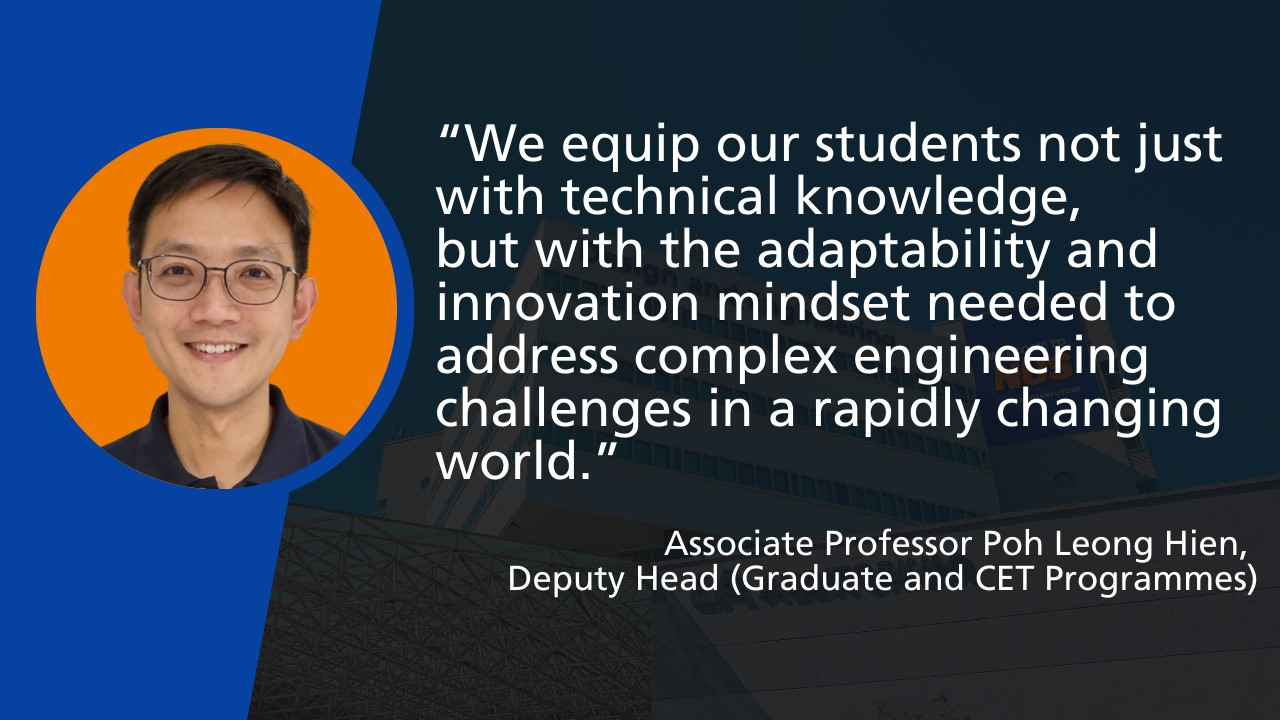
Curriculum Designed for Tomorrow's Challenges
The MSc in Civil Engineering programme stands out for its forward-looking curriculum, which is consistently updated to address emerging industry needs. Students gain exposure to cutting-edge courses such as Structural Health Monitoring, Digital Technologies for Construction, Mobility, Climate Change and Energy Market, and Climate Science for Engineers as well as opportunities for industrial attachments and student exchange programmes.
Abdul Wahab Shahulhameed Mohamed Ashiq, a recent graduate of the MSc (Civil Engineering) programme, secured full-time employment as a Design Engineer at CKMbT International through the programme’s industrial attachment initiative. He notes, "The programme was pivotal in advancing my career. The curriculum bridged the gap between academic knowledge and industry requirements, especially through the Industrial Attachment course, which provided hands-on experience and valuable professional connections."
Real-World Experience Through Capstone Projects and Industrial Attachments
One of the programme's distinguishing features is its practical components. The Capstone Project allows students to work on complex, real-world problems under the guidance of established industry practitioners. This project integrates concepts from specialisation courses and provides hands-on experience with the same commercial software used by industry professionals.
"One of my key personal achievements was the improvement in my teamwork and project management skills, particularly developed during the Capstone Project," shares Mohamed Ashiq. "This experience sharpened my ability to collaborate effectively with others, which proved invaluable during my industrial attachment."
The programme was also among the first to implement industrial internships, enabling students to connect with leading players in Singapore’s construction industry.
Li Tan is another recent graduate, who has secured full-time employment as a Transport Planner at TTS Group. He shared, "I chose three unconventional courses: Research Project, Capstone Project for Structural Engineering, and Industrial Attachment. These courses are not traditional classroom-based lectures followed by homework. Each course has its approach to connect with cutting-edge technology, projects, and industry."
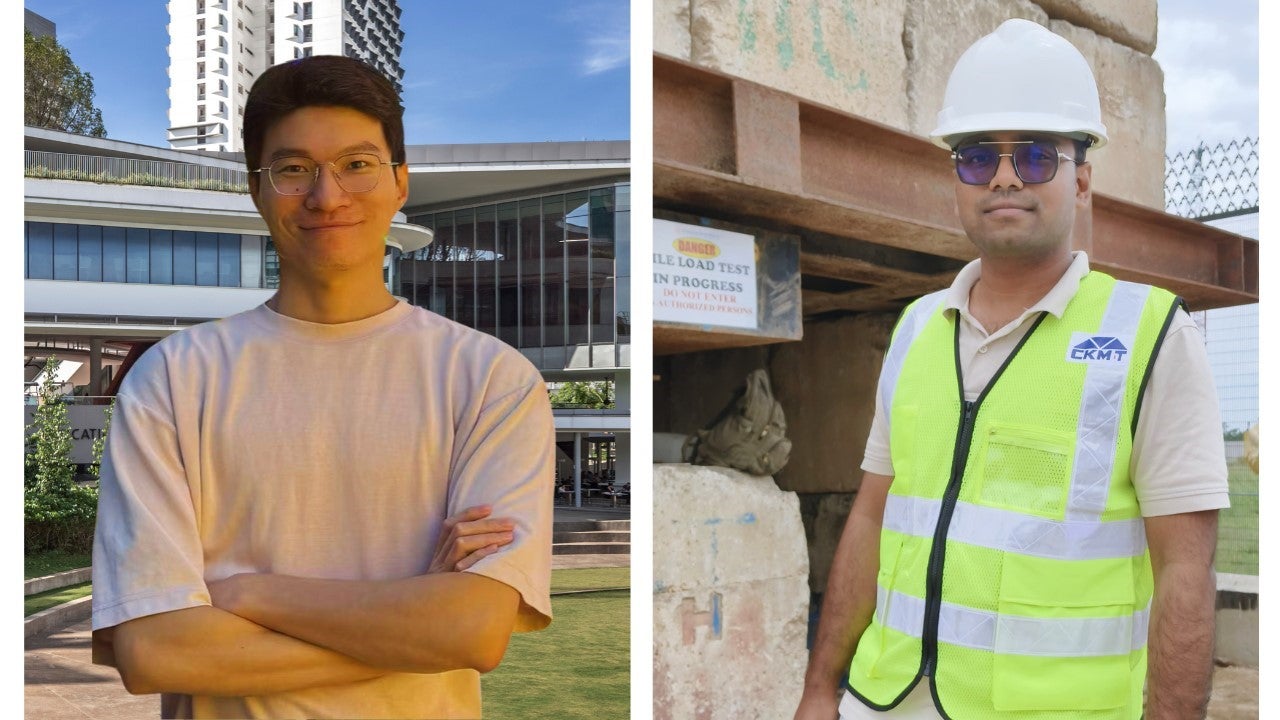
Specialisations Addressing Emerging Challenges
The programme offers specialisations in digitalisation and management, transport and urban mobility, and sustainable climate resilience. All these are emerging topics in the Built Environment sector that address challenges in urbanisation and sustainability.
The learning extends beyond the classroom through site visits to locations like Singapore's first smart district at Punggol Digital District, Tuas Water Reclamation Plant, and sustainable solutions at Keppel South Central and the East Coast Integrated Depot. These visits help students deepen their understanding of theoretical concepts by seeing them applied in real-world settings.
Li Tan reflects, "While my undergraduate education focused on learning and mastering technology, my master's education has taught me how to apply technology and leverage the latest advancements to complete real-world projects, bringing me closer to the operational dynamics of society."
Excellence Driven by World-Class Faculty
Students of the MSc in Civil Engineering programme benefit from the guidance of highly qualified faculty members, several of which have been identified by Stanford University as the world's top 2% of scientists. This impressive roster includes Professor Vladan Babovic, Professor Balasubramanian Rajasekhar, and Professor Karina Gin, among others.
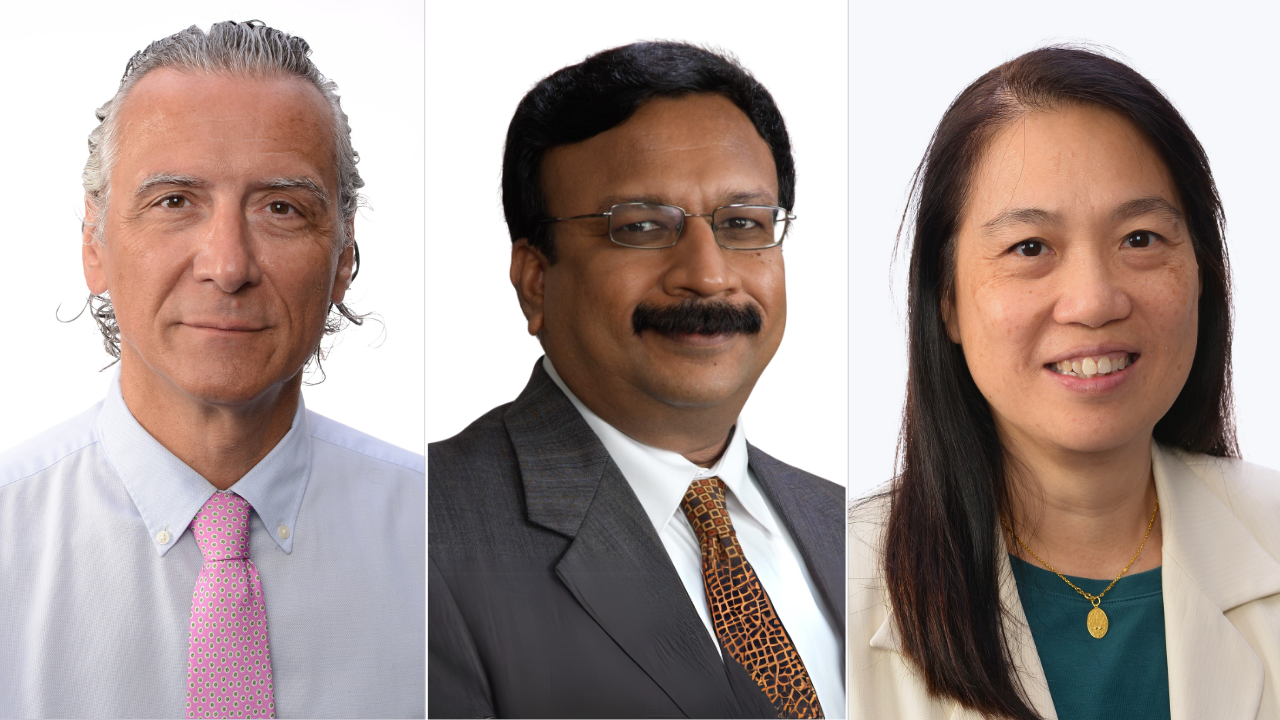
The programme also features award-winning educators. Dr Du Hongjian, Associate Professor Kevin Kuang Sze Chiang, Dr Justin Yeoh Ker-Wei, and Associate Professor Poh Leong Hien have all received the NUS Annual Teaching Excellence Award, demonstrating their commitment to providing exceptional educational experiences.
Mohamed Ashiq emphasises the supportive learning environment, "Dr Richard Liew's engaging teaching style helped me visualise complex steel structure concepts, while Dr Kong Kian Hau's accessibility and dedication were invaluable in clarifying doubts."
Li Tan highlights the meticulous teaching and mentoring system, "With a supportive faculty, learning no longer feels like a solitary battle. I can closely communicate with teaching assistants or professors and academic discussions can be conducted through email, video calls, or even in-person meetings."
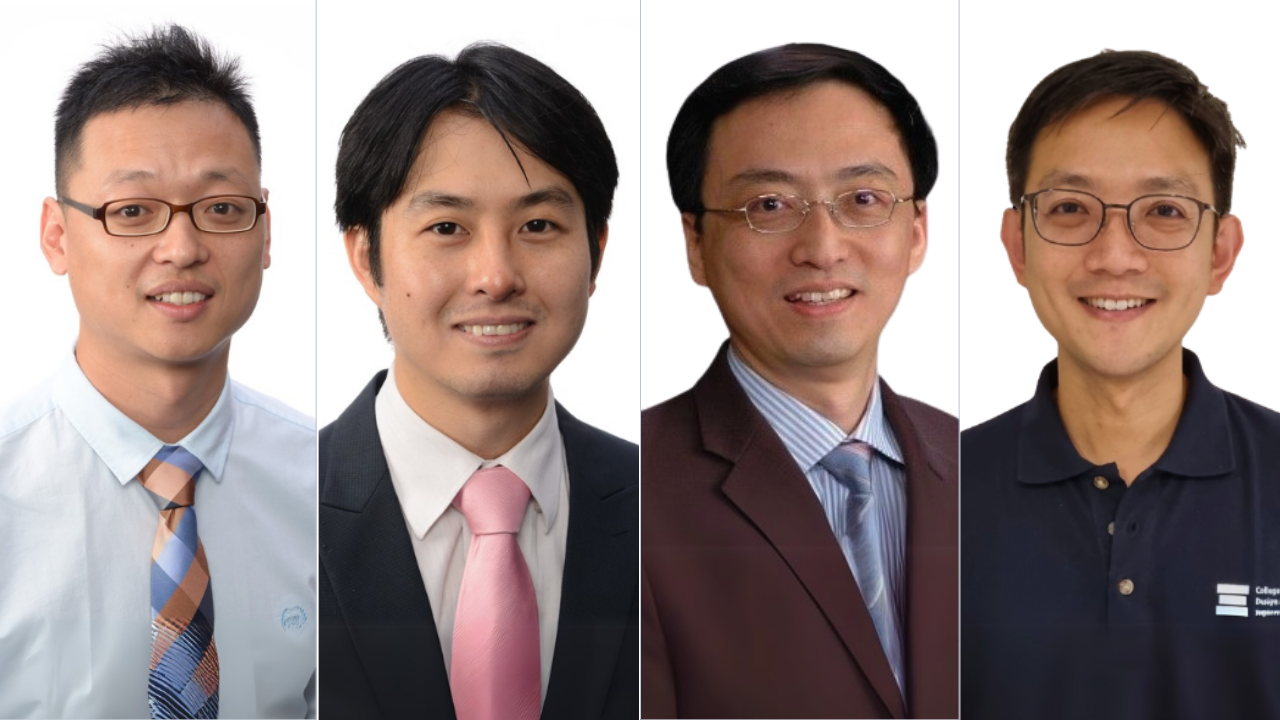
Building Global Perspectives and Professional Communities
The MSc in Civil Engineering programme goes beyond classroom learning to provide students with both international exposure and strong professional networks. In a unique offering for the master's programme, it facilitates student exchanges with partner institutions in Europe and Australasia. The programme is also in discussions to partner with universities in other regions, allowing students to broaden their cultural horizons while acquiring valuable international perspectives.
Complementing this global outlook is a focus on building a strong professional community among students. The newly established MSc student club organises recreational activities such as movie nights and historical cycling tours, designed to help graduate students form meaningful connections with like-minded, high-calibre individuals in the sector. These initiatives create a balanced academic journey while establishing professional networks that often prove invaluable throughout graduates' careers.
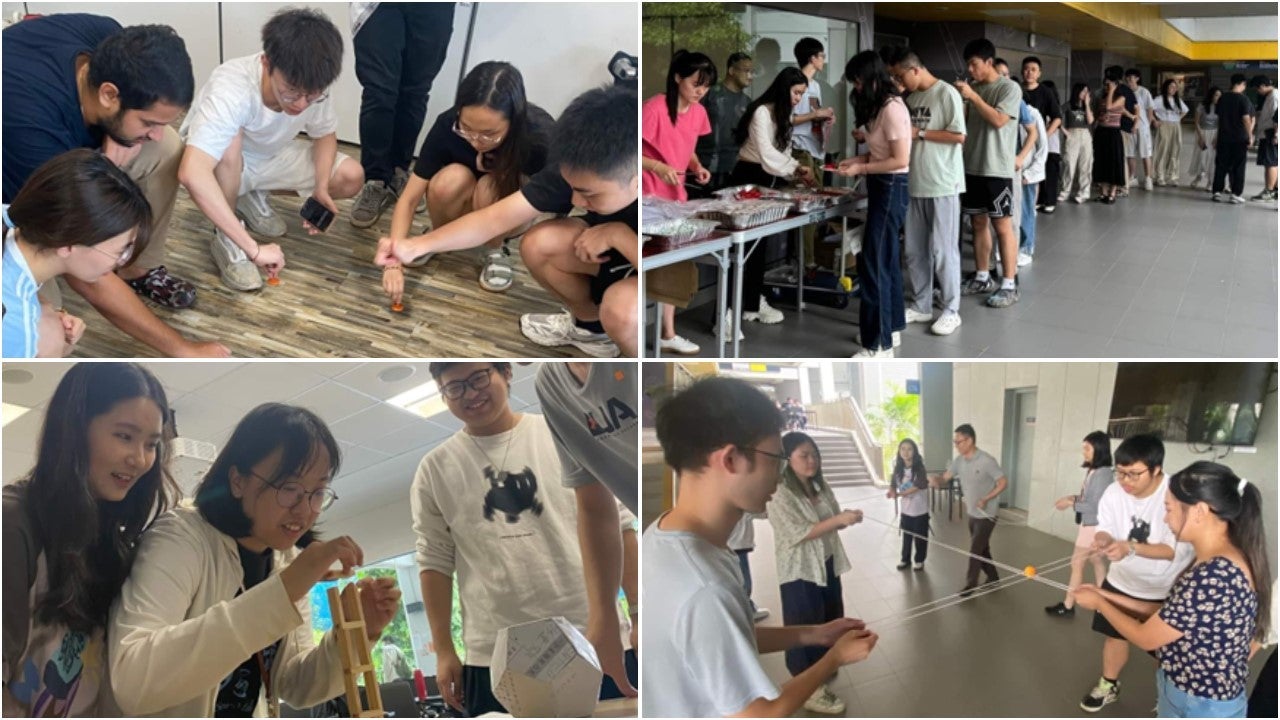
Conclusion: Preparing for an Impactful Career
As our discussion with Associate Professor Poh concludes, he summarises the unique value of the MSc in Civil Engineering: "We equip our students not just with technical knowledge, but with the adaptability and innovation mindset needed to address complex engineering challenges in a rapidly changing world."
For prospective students looking to advance their careers in civil engineering, this programme offers a compelling blend of cutting-edge curriculum, practical experience, world-class faculty, and global perspectives. The success stories of current students and alumni provide tangible evidence of the programme's effectiveness in preparing graduates for meaningful contributions to the field.
Learn more about the programme here.
Read More
Department of Civil and Environmental Engineering ▏Master of Science (Civil Engineering)
Back to Scholar Insights to read more stories about CDE graduate programmes
College of Design and Engineering, NUS
Blk EA #06-16
9 Engineering Drive 1
Singapore 117575


